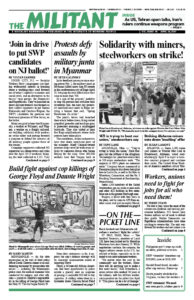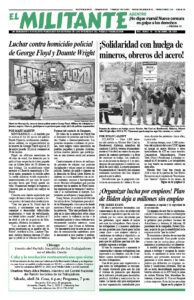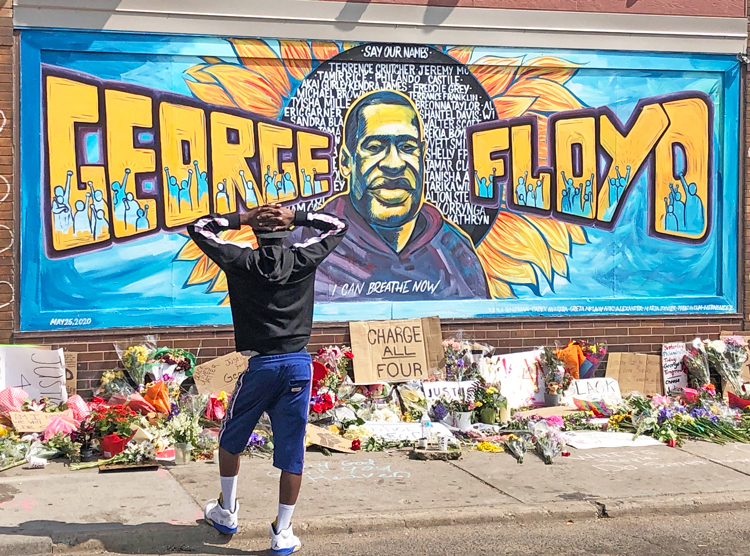MINNEAPOLIS — As the state prosecution in the trial of fired police officer Derek Chauvin comes to an end, damning testimony by prosecution witnesses — including the Minneapolis police chief, the medical examiner who conducted the autopsy, and other officials — points to Chauvin’s responsibility in the killing of George Floyd here last May 25. The trial began March 29.
From their statements so far, it appears the cop’s defense strategy will be character assassination aimed at smearing Floyd.
Floyd, a 46-year-old African American, had been apprehended by police outside a grocery store on suspicion of passing a counterfeit $20 bill to buy cigarettes. A chilling video taken by a bystander shows Chauvin forced Floyd onto the ground, put his knee on Floyd’s neck as he’s handcuffed and kept it there for over nine minutes until Floyd stops crying out for help and then becomes lifeless. Seeing Floyd suffer, numerous eyewitnesses pled with Chauvin to get off Floyd.
Chauvin is charged with second- and third-degree murder and manslaughter. Three additional fired officers, who helped restrain Floyd — J. Alexander Kueng, Thomas Lane and Tou Thao — face trial in August on charges of aiding and abetting second-degree murder and manslaughter.
“Once Mr. Floyd had stopped resisting — and certainly once he was in distress and trying to verbalize that — that should have stopped,” Minneapolis Police Chief Medaria Arradondo testified April 5.
The medical examiner who preformed the autopsy and other medical personnel testified that Floyd was killed by the cops’ actions.
“The activities of the law enforcement officers resulted in Mr. Floyd’s death, and specifically those activities were the subdual restraint and the neck compression,” testified Dr. Lindsey Thomas, a medical examiner for 37 years who retired from the Hennepin County Medical Examiner’s Office and still works part time as a forensic pathologist.
The video of Floyd’s death at the hands of police was seen around the world and sparked protests across the U.S. and internationally. The protests drew in millions — Black and Caucasian alike — in small towns and large cities, including many young people participating in social protest for the first time.
Contrary to the desire of millions to take a disciplined, effective stand against police violence, antifa forces and elements in the Black Lives Matter leadership instead led and justified an anti-working-class course, including violence, looting and race baiting. Many working people who wanted to protest the cop killing of Floyd were repulsed by the violence and destruction and stayed away. Protests shrank, then stopped.
Doug Nelson, Socialist Workers Party candidate for mayor of Minneapolis, lives near where Floyd was killed and joined in many of the protests. “There is a deep discussion going on in the working class about how to fight racist violence and police brutality and how to most effectively defend our interests as workers,” Nelson told the Militant. “You won’t find any of this in the big-business media, but you will if you knock on doors and engage people worker to worker — as SWP campaigners do.
“A couple of days ago I was campaigning in a racially mixed, working-class neighborhood near George Floyd Square. Like much of Minneapolis today, many houses display signs supporting the fight against police brutality,” Nelson said.
“People we talked with wanted to discuss what to do about the issues posed in the trial and about the broader economic and social crisis working people face.
“To find the answers we must look to ourselves as workers, not to the bosses’ government, their parties and their ‘solutions,’ I told people. We must strengthen our unions in the coming fights against the boss attacks,” he said.
“We must organize and instill discipline as part of those battles, including the fight against police brutality, and any other forms of exploitation and oppression. Our goal has to be to draw in the majority of working people, who are increasingly looking for a working-class road forward,” said Nelson.
Deep discussion on road forward
SWP candidates and campaign supporters in the Upper Midwest — those who back Nelson’s campaign and those supporting Joe Swanson for City Council in Lincoln, Nebraska, as well as Illinois SWP state campaign chair Dan Fein — are collaborating and campaigning to spread working-class solidarity and the SWP’s program to meet today’s attacks by the boss class.
On April 10 a team of campaign supporters, including Ilona Gersh from Chicago, campaigned in North Minneapolis where they met Lloyd Greer on his porch.
They introduced the SWP campaign platform, including the need for our unions to fight for a government-funded public works program to create millions of jobs at union-scale wages to build hospitals, schools, housing and other things workers need. They urged workers to join in building solidarity with the locked-out workers at Marathon Petroleum in nearby St. Paul Park.
Gersh told Greer she had participated in protests in Chicago against the cop killing of Floyd.
Greer is a long-term resident of the neighborhood. “The police don’t know the neighborhood, they don’t know the people who live here, they don’t engage with us,” he said. “In George Floyd’s case, if they knew him, maybe they would’ve talked with him first. It’s hard for me to trust the police to protect me from the monsters out there when they’re acting like monsters themselves.”
“The cops and the capitalist rulers they serve think all of us are ‘deplorables’ and criminals,” Gersh said. “I believe that without the public demonstrations, there wouldn’t be a trial today.”
“Yes, when we make them hear us, it makes things happen,” said Greer. “I don’t know if he’ll be convicted.”
“The police are rarely prosecuted because the bosses and politicians use police intimidation and brutality to try and keep workers in line,” Gersh said.
“I went to George Floyd Square, but I didn’t participate. It was too dangerous, and I was bringing my kids,” said Greer. “I support the movement, though.”
“Malcolm X said his aim was to wake people up to our worth, our capabilities, not our oppression,” Gersh said. “Whenever we organize to fight together — whether in a strike battle or against police brutality — we begin to transform ourselves into stronger, more class-conscious political people. Anti-social behavior goes down.”
Also campaigning in North Minneapolis, David Rosenfeld and Helen Meyers met Sandy Roy-Carter who wanted to know what the SWP campaign had to say on how to fight against racism.
“We explain that the fight against racism is class versus class, not race against race,” Rosenfeld said.
“I agree it’s a class thing,” Roy- Carter said. “People get separated and divided.”
Pointing to the testimony so far in the trial of Derek Chauvin, she said, “It’s good to finally be vindicated about what the cops really do. But this trial won’t solve police brutality or racism.”
Jessica Little, a member of the United Food and Commercial Workers union who works as a cashier at a grocery co-op, recalled the protests in Minneapolis last summer. But then groups who wanted to commit violence went into action. “It scared the crap out of me and other people when sections of the city were burned and shut down,” Little said. “Those who destroyed things undermined the ability of others to organize.”
Cops kill Daunte Wright
On April 11, cops in a city near Minneapolis, Brooklyn Center, stopped, shot and killed 20-year-old Daunte Wright, who is African American. They claim they pulled him over for an out-of-date registration sticker and then saw he had an outstanding warrant. The cops say he tried to drive away.
The city’s police chief, Tim Gannon, says it was a horrible accident, that the cop — later identified as Kimberly Potter, a 26-year veteran and president of the Brooklyn Center Police Officers Association — meant to shoot her Taser, but pulled her gun instead.
He played her police body camera video, and Potter can be heard saying, “I’ll tase you. Taser! Taser! Taser!” then fires. Hearing the shot, she says, “Holy s–t! I just shot him.”
Protests broke out that night, marked by looting and violence. Some 20 stores were broken into.
“All the violence, if it keeps going, it’s only going to be about the violence,” Katie Wright, Daunte’s mother, told protesters. “We need it to be about why my son got shot for no reason. We need to make sure it’s about him and not about smashing police cars, because that’s not going to bring my son back.”
Both Gannon and Potter resigned April 13.
“The police killing of Daunte Wright is just the latest incident laying bare the fundamental anti-working-class character of the cops, whose brutality has always been brought down particularly hard on the Black community,” SWP candidate Nelson said April 12. “It highlights the need for the kinds of protests that can mobilize the largest outpourings possible against this brutality. This requires the organization of a broad, popular and disciplined working-class movement.”


